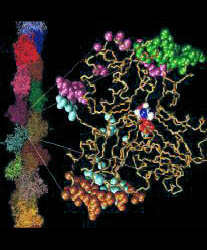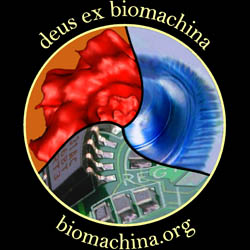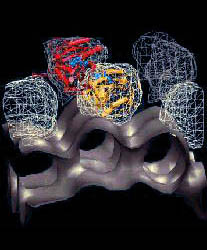 Biomachina News Room
Biomachina News Room

Wriggers Relocates to New
York City
Biomachina founder Willy
Wriggers
will join the privately funded research
institute D.E. Shaw Research (DESRES) in Manhattan in the fall of 2007. Wriggers has also taken up
a secondary faculty
appointment at Weill Medical
College of Cornell University (WMC). Assistant Professor Stefan
Birmanns
has
been promoted to tenure-track and will manage the Houston research program. Existing software
developments and collaborations will continue uninterrupted.
FAQs answered by Willy Wriggers:
- Q: Why the move?
A: This
arrangement gives me an opportunity to be free from
grants and administrative responsibilities and to focus more on
research and writing. DESRES specializes in long-time simulaton of
protein
dynamics. The group is incorporated on Times Square in Manhattan. Chief
scientist David Shaw
is also a Forbes-listed billionaire and his successful hedge fund and
quantitative trading firm is housed in the same building. It's a
fantastic opportunity and I'm sure many scientists would consider such
an unconventional career move.
- Q: Are you leaving science /
academia?
A: Although DESRES is a corporation I found their research environment
very academic, not much different in many ways from a non-profit
research organisation such as Scripps. I will report to David and I
won't have students working for me, so I do give up a little freedom.
However, the coworkers there are all first rate scientists who publish frequently. I am very
enthusiastic about their research and I have no problems being a
team player. When I look back at my career I was happiest when I had
the opportunity to be personally involved in science. I have seen it
all and went from student to tenure in nine years, what would be the next challenge?
Also, if I do get an urge to teach or to interact with students, this is what I will do in a
limited role at WMC.
- Q: What about your coworkers? A:
The transition will be handled in a responsible manner and all Houston
personnel will keep their positions. The new manager, Stefan Birmanns,
has collaborated with us starting in 2000, first as a graduate
student and in 2003 he joined us formally as a postdoctoral associate.
In 2006 he was promoted to
faculty due to his significant contributions to the School of Health
Information Sciences. Stefan knows all details of our operation and
he is ideal for taking over the day-to-day responsibilities. I will remain in an advisory role in the near future.
- Q: What will happen to your
grants? A: I'm very grateful to NIH, the
Human Frontier Science Program, the Houston Keck Center, the Alfred P. Sloan Foundation, the
John P. McGovern Foundation, and many others for their past
support. Most grants are expiring naturally this year, except for my
NIH R01 which will remain in Houston.
- Q: Are you leaving the Electron
Microscopy field? A: I have been involved with
the EM field for nearly 10 years and we have a reputation for our
docking programs which are widely used in the community. With
thousands of users I made sure there is a plan in place for continued
support and development. I will remain involved in the support and
development of UNIX-based Situs
programs. Stefan will develop mainly his graphics based interactive program Sculptor. We will
continue to support existing collaborations.
- Q: What will be your new
research interests? A:
I'm interested in
statistical sampling of molecular dynamics (MD) trajectories as well as
simulated folding and prediction of large scale domain movements. I
started this work as a graduate student and later continued with my
postdoc Zhiyong Zhang here in Houston. Many cancer-related systems
require adequate sampling of the
conformational variability. I believe that MD will see significant
advances in this area in the near
future through the new supercomputing architectures developed at DESRES.




![]()



![]()
![]()
![]()